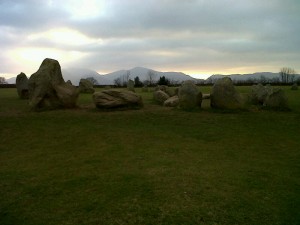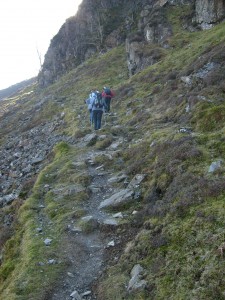 I’ve done enough walking in the Lake District to appreciate a glorious day when we get one, and we hadn’t been walking ten minutes on the steep ascent to the stretch of the Newlands Horseshoe between Maiden Moor and High Spy before we were stripping off layers – in March. We were definitely in for a glorious day!
I’ve done enough walking in the Lake District to appreciate a glorious day when we get one, and we hadn’t been walking ten minutes on the steep ascent to the stretch of the Newlands Horseshoe between Maiden Moor and High Spy before we were stripping off layers – in March. We were definitely in for a glorious day!
My husband and I have walked the entire Newlands Horseshoe as well as bits and pieces of it with friends. This time my sister was visiting from the States, so this was her introduction to the Lakes. It was being caught out in the mist and heavy rain on the ridge between Maiden Moor and High Spy that inspired the opening chapters of Lakeland Heatwave: Body Temperature and Rising. So on this glorious March day, I was all about research. I’d done my map work, I’d read my Wainwright. In my mind’s eye I knew exactly the place I had in mind for Marie and Anderson to escape the inclement weather and get to know each other a little better. But I had to see for myself. I had to know that the rout I’d chosen would give my lovely couple all the challenges they need, plus a safe and dry hideaway.
I’ve experienced that frisson of fear at being caught out on this ridge when anyone with half a brain would have stayed inside. Though it was hard to imagine that kind of weather when we arrived at the top of High Spy with its enormous cairn and ate our lunch while enjoying the heart stopping views and exquisite beauty of the Newlands Valley.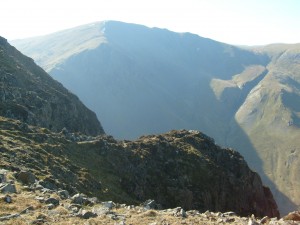
Once lunch was done and all the remnants stowed, it was time for research. Instead of heading up Dale Head and on around the horseshoe, we descended through the Rigghead Quarries along Tongue Gill, as Marie and Anderson would have done to get out of the weather. I chose the Rigghead descent because I knew there would be caverns and quarries for our couple to find shelter in, but even my imagination hadn’t prepared me for the steepness nor the roughness of the descent.
The Rigghead Quarries were slate mines and the leavings litter an already very steep descent. As I worked my way down with the help of two walking poles, good grippy boots, fabulous weather and dry slate shifting beneath my feet, I can only imagine what that descent would be like for my hero and heroine, when the rock is rain slicked, the wind is up and the mist is down. Even in the inclemently warm sun, I had to shiver at the thought.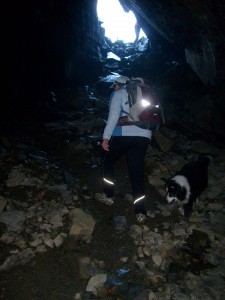
As well as my sister, Nancy, we did the walk with two of our very dear walking companions from the Lake District, Brian and Vron Spencer, who know the place better than most people know the inside of their own homes. Brian volunteers for Keswick Mountain Rescue and knew exactly what I was looking for. The cavern about half way down gaped wide into the side of the fell and the opening was littered with leavings and slick boulders. Water dripped heavily from up above. I ducked inside and carefully made my way into the main room, which disappeared beyond the light of my headlamp down a steep bend to the left. Once past the entrance though, the main room was dry and large and with a little effort could have been comfortable enough to wait out a bad storm. It wasn’t at all difficult to imagine Marie and Anderson snuggled together amid the slate leavings. Oh yes! This was the place!
We probably spent another hour poking in and out of other less threatening, smaller hidey-holes before we continued picking our way very carefully down the steep, make-shift stone steps the miners would have trod every day in all kinds of weather. Halfway down, Brian directed us to a place where the stream flowed fast over the rocks for some to the best, coldest water I’ve ever tasted. We followed the path on into the Borrowdale Valley alongside Castle Crag along the river and on back to the car park with my head spinning at all the possibilities.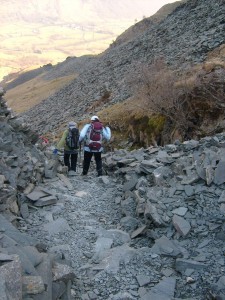
I was pleased that the drama of the walk matched the opening of the novel exactly as I hoped. I spent the rest of my time taking in the feel of the local atmosphere. I had a couple pints at the Twa Dogs Pub. I watched the sunset on the Fells above Derwent Water. I felt the hair raise along my neck at the eerie atmosphere of Castlerigg Stone Circle nestled for the past four and a half thousand years on its grassy plateau amid the fells. The Lake District always inspires me, and this trip was no exception. Such hands-on (or in this case feet-on) research is something I could very easily get used to, and as one who often walks the stories I write, it seemed appropriate to walk the research too. 